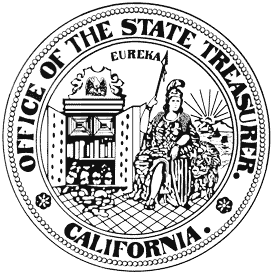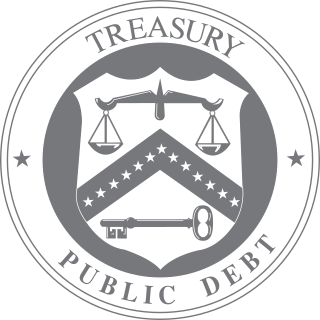
A pension is a fund into which amounts are paid regularly during an individual's working career, and from which periodic payments are made to support the person's retirement from work. A pension may be:

The Department of the Treasury (USDT) is the national treasury and finance department of the federal government of the United States, where it serves as an executive department. The department oversees the Bureau of Engraving and Printing and the U.S. Mint. These two agencies are responsible for printing all paper currency and minting coins, while the treasury executes currency circulation in the domestic fiscal system. The USDT collects all federal taxes through the Internal Revenue Service; manages U.S. government debt instruments; licenses and supervises banks and thrift institutions; and advises the legislative and executive branches on matters of fiscal policy. The department is administered by the secretary of the treasury, who is a member of the Cabinet. The treasurer of the United States has limited statutory duties, but advises the Secretary on various matters such as coinage and currency production. Signatures of both officials appear on all Federal Reserve notes.

His Majesty's Treasury, occasionally referred to as the Exchequer, or more informally the Treasury, is a department of His Majesty's Government responsible for developing and executing the government's public finance policy and economic policy. The Treasury maintains the Online System for Central Accounting and Reporting (OSCAR), the replacement for the Combined Online Information System (COINS), which itemises departmental spending under thousands of category headings, and from which the Whole of Government Accounts (WGA) annual financial statements are produced.
An investor is a person who allocates financial capital with the expectation of a future return (profit) or to gain an advantage (interest). Through this allocated capital the investor usually purchases some species of property. Types of investments include equity, debt, securities, real estate, infrastructure, currency, commodity, token, derivatives such as put and call options, futures, forwards, etc. This definition makes no distinction between the investors in the primary and secondary markets. That is, someone who provides a business with capital and someone who buys a stock are both investors. An investor who owns stock is a shareholder.

An offshore bank is a bank that is operated and regulated under international banking license, which usually prohibits the bank from establishing any business activities in the jurisdiction of establishment. Due to less regulation and transparency, accounts with offshore banks were often used to hide undeclared income. Since the 1980s, jurisdictions that provide financial services to nonresidents on a big scale can be referred to as offshore financial centres. OFCs often also levy little or no corporation tax and/or personal income and high direct taxes such as duty, making the cost of living high.

United States Treasury securities, also called Treasuries or Treasurys, are government debt instruments issued by the United States Department of the Treasury to finance government spending, in addition to taxation. Since 2012, the U.S. government debt has been managed by the Bureau of the Fiscal Service, succeeding the Bureau of the Public Debt.

The state controller of California is a constitutional office in the executive branch of the government of the U.S. state of California. Thirty-three individuals have held the office of state controller since statehood. The incumbent is Malia Cohen, a Democrat. The state controller's main office is located at 300 Capitol Mall in Sacramento.

The state treasurer of California is a constitutional officer in the executive branch of the government of the U.S. state of California. Thirty-five individuals have held the office of state treasurer since statehood. The incumbent is Fiona Ma, a Democrat. The state treasurer's main office is located in the Jesse M. Unruh State Office Building in Sacramento.

The Bureau of the Public Debt was an agency within the Fiscal Service of the United States Department of the Treasury. United States Secretary of the Treasury Timothy Geithner issued a directive that the Bureau be combined with the Financial Management Service to form the Bureau of the Fiscal Service in 2012.

The state auditor of Minnesota is a constitutional officer in the executive branch of the U.S. state of Minnesota. Nineteen individuals have held the office of state auditor since statehood. The incumbent is Julie Blaha, a DFLer.
Film finance is an aspect of film production that occurs during the development stage prior to pre-production, and is concerned with determining the potential value of a proposed film.

The State Treasurer of Oklahoma is the chief custodian of Oklahoma's cash deposits, monies from bond sales, and other securities and collateral and directs the investments of those assets. The treasurer provides for the safe and efficient operation of state government through effective banking, investment, and cash management. The state treasurer has the powers of a typical chief financial officer for a corporation.

Alberta Investment Management Corporation (AIMCo) is a Canadian Crown corporation and institutional investor established to manage several public funds and pensions headquartered in Edmonton, Alberta. AIMCo was established by an act of the Legislative Assembly of Alberta in 2008 under the government of Progressive Conservative Premier Ed Stelmach.
The Indiana Treasurer of State is a constitutional and elected office in the executive branch of the government of Indiana. The treasurer is responsible for managing the finances of the U.S. state of Indiana. The position was filled by appointment from 1816 until the adoption of the new Constitution of Indiana in 1851, which made the position filled by election. As of 2023, there have been fifty-five treasurers. The incumbent is Republican Dan Elliott who has served in the position since January 9, 2023.
A Certified California Municipal Treasurer (CCMT) is a post-nominal professional certification awarded by the California Municipal Treasurers Association (CMTA) to California public treasurers who meet standards of education, experience, and a stated commitment to a code of ethics. It was created in 1978 to provide a professional standard of financial expertise and ethics in California government treasury.
Texas State Treasurer was an elected constitutional officer in the executive branch of the state government of Texas, responsible for overseeing the financial operations of state government. The position was established in the Constitution of 1876. It was abolished in 1996.

On March 23, 2009, the United States Federal Deposit Insurance Corporation (FDIC), the Federal Reserve, and the United States Treasury Department announced the Public–Private Investment Program for Legacy Assets. The program is designed to provide liquidity for so-called "toxic assets" on the balance sheets of financial institutions. This program is one of the initiatives coming out of the implementation of the Troubled Asset Relief Program (TARP) as implemented by the U.S. Treasury under Secretary Timothy Geithner. The major stock market indexes in the United States rallied on the day of the announcement rising by over six percent with the shares of bank stocks leading the way. As of early June 2009, the program had not been implemented yet and was considered delayed. Yet, the Legacy Securities Program implemented by the Federal Reserve has begun by fall 2009 and the Legacy Loans Program is being tested by the FDIC. The proposed size of the program has been drastically reduced relative to its proposed size when it was rolled out.

The New York City Department of Finance (DOF) is the revenue service, taxation agency and recorder of deeds of the government of New York City. Its Parking Violations Bureau is an administrative court that adjudicates parking violations, while its Sheriff's Office is the city's primary civil law enforcement agency.

A green bank is a financial institution, typically public or quasi-public, that employs innovative financing techniques and market development tools in collaboration with the private sector to expedite the deployment of clean energy technologies. Green banks use public funds to leverage private investment in clean energy technologies that, despite their commercial viability, have struggled to establish a widespread presence in consumer markets. Green banks aim to reduce energy costs for ratepayers, stimulate private sector investment and economic activity, and expedite the transition to a low-carbon economy.

Stacy L. Garrity is an American politician, businesswoman, and soldier. She is currently serving as Pennsylvania Treasurer as a Republican, a position to which she was elected in 2020. She previously served in the United States Army Reserve for 30 years and through three deployments during the Gulf War and Iraq War, where she was called "The Angel of the Desert" by other US military officers. She left the Army Reserve in 2016 at the rank of colonel. Garrity worked at Global Tungsten & Powders Corp. from 1987 to 2021, where she reached the level of Vice President. In 2019, Garrity entered politics and ran for the Republican nomination for a special election in Pennsylvania's 12th congressional district, but lost to Fred Keller, who went on to win in the general election.
















































